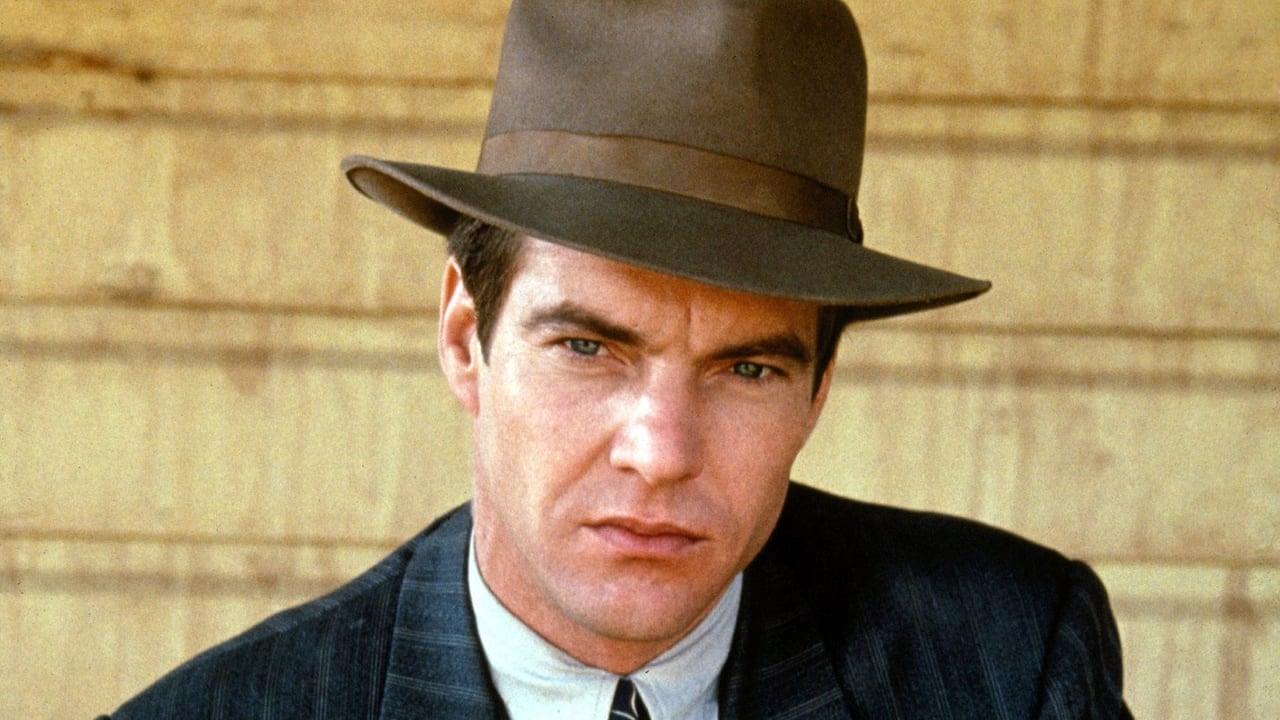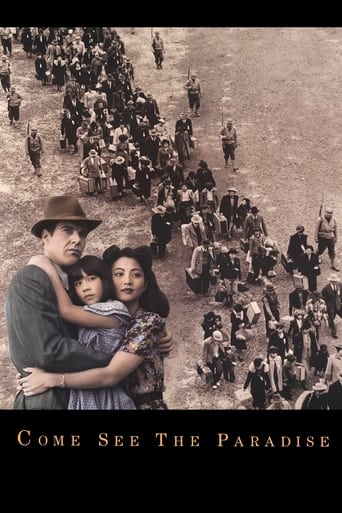

The movie "Come See the Paradise" was accurate in the fact that after the Pearl Harbor Attack, by the Japanese, the United States Government decided to relocate the Japanese into isolated internment camps in fear that some could be spies working at perhaps a bigger attack within America instead of on the coast. In the movie, Lily's family is forced to move out and forced into an internment camp without knowing why or when they will be released. Additionally, in the camp there were riots as well against the fact that the Japanese were ethnically isolated from the rest of society and Lily's brother took part in the riots with her family thinking that he wouldn't. In addition, Lily and Jack, Dennis Quaid's character, have had a daughter, who goes into the camp with her mother, while Jack goes into the Army, but not before one of the most lacerating scenes in the film, when Jack takes his little daughter to meet Santa Claus, and Santa refuses to let the child sit on his lap. "She's an American," Jack informs Santa, grabbing him, "and you will sit here and listen to what she wants for Christmas or I will kill you." "Come See the Paradise" has been criticized in a few places because it uses a technique that is common in movies about minority groups: A convenient Caucasian provides the point of view, so that the audience will have someone to identify with. The fact that it was told from this point of view does not sit well with me because the director is assuming a large Caucasian audience, which might not be the case, and the director also decides to include slurs appointed at the Japanese as well, which makes those that are Japanese watching this film very uncomfortable. So I think this movie was accurate. but in terms of audience liking it had a minimal effect on me.
... View MoreCome See the Paradise is another typical Hollywood depiction of a rarely mentioned event in America's complicated history. The movie does its job of creating an emotional reaction and one that makes you feel sympathy for the characters and their situation, but in terms of historical content there are some inconsistencies. My biggest question after watching this film is the necessity of including a love story amongst a topic that could constitute its own movie. In my opinion, the notion of holding people in a camp against their will should constitute enough emotion that a romantic interest is not necessary. Sure, the love story adds an aspect of intrigue and brings people to the movie by playing up the romantic storyline, but, in actually, the depicted relationship is wildly inaccurate in a historical sense. An interracial couple such as Lily and Jack would have had immensely more struggles in their daily lives. The fact that they just walked into a wedding as a couple and nobody said anything to them would have been highly, highly unlikely in the 1930's. Likewise, the couple would have had trouble procuring service at a restaurant, getting a hotel room and even going out in public without garnering some quizzical looks. I understand the necessity of including a love story for modern audiences, but to someone watching with the intent to analyze historical content this can be more of a distraction than a delight. I believe that the scenes taking place in the camp could have completely stood on their own without the appearance of Dennis Quaid's character. Conversely, the movie was fairly accurate with other historical details related to the life of the Kawamuras. The recreation of Little Tokyo was filled with impressive props and attention to detail. The reference to the Japanese Citizen's League, Question 26 concerning American loyalty and the No-No boys were a sight for weary eyes at that point in the movie. In the end, nothing can be done about the fact that, overall, this is a Hollywood production and the main goal of the movie is to put people in the audience. In terms of historical accuracies, there was good attention to detail in general, though the love story is an unnecessary aspect of the film. The main redeeming aspect of this film is that it spreads the story of Japanese internment to Hollywood's audiences, but why must this be done through an aspect of love? Isn't the narrative of life before, during and after internment enough to create a film worthy of Hollywood?
... View MoreThe film Come See the Paradise is a fairly standard Hollywood depiction of internment camps in the sense that it fails to focus on the many of the issues concerning internment and instead spends most of the film following an unbelievable and not convincing love story. The issue of Japanese internment is a charged subject and one of the darkest moments in American history. Thousands of American citizens and immigrants had their rights violated in dramatic ways because of racial prejudice. If one wants to portray this event in American history, the film must be tactful and treat the stories with care-Come See the Paradise failed to do this in almost every scene in the movie. The majority of movie, which runs two hours and eighteen minutes long, follows the relationship of Lucy Kawamura, an American citizen of Japanese descent portrayed by Tamlyn Tomita, and Jack McGurn, an Irish American played by Dennis Quaid who once again proves he can only be called an actor on a technicality. Watching their relationship unfold on the screen is frustrating to say the least. The film fails to address the real animosity an interracial couple at that time would face and therefore misses an opportunity to make a powerful commentary on the American social norms. Also, the character of Jack McGurn does not need be in the film at all. His character just serves as a way to engage traditional American audiences and generally detracts from any points the film attempts to make. There are several instances in the film which occur in the camp that are impactful. The discussion of the loyalty clauses the American government wanted the internees to sign and the dismal conditions within the camp were discussed and portrayed well. The film, however, choses to not focus on these events and instead continues to follow Jack McGurn and his struggles within the army. The film should have remained focused on the Kawamura family's experiences within the camp and attempt to portray the hardships and complex decisions which emerged during the course of the internment. Substance was sacrificed in this film in order to create a movie that would appeal to American audiences. Yet the film was still dismal by Hollywood standards as it had a cliché script, terrible acting, and overall muddle plot line which contained no resolution. I personally feel that if one is going to make a film about such as sensitive topic as Japanese Internment during World War II commercial goals should not be valued as much as concern for the memory of the victims and survivors.
... View MoreAs the title of my review states, I enjoyed Come See the Paradise and feel as though it represented Japanese-American internment well, but the film did make some choices with which I do not agree.The film did well in depicting internment. One thing that some Americans may struggle with is being critical of the country many call "the land of the free", but this film does not shy away from criticizing the United States' decision to unjustly intern those of Japanese descent during World War II. This can be seen when Lily argues with white camp officials, calling the camp a prison and when Charlie, an American citizen who barely spoke any Japanese, repatriates to Japan after the war, disgusted with the internment. Seeing a Hollywood film about American citizens encamped could open viewer's eyes to an ugly part of the United States' history and serve as a warning that freedoms can be infringed upon and that we must do our part to stop anything like this from happening within the United States again.The film also did a decent job at showing how the camp interrupted the lives of Japanese-Americans. The Kawamura family had a thriving movie theater and a beautiful home, but all of this was taken away in an instant with encampment. Although the aftereffects of the camp are hardly explored, the Kawamura family members do not have their lives to return to in Los Angeles, showing how a camp experience can impact people even after liberation.All this being said, the film did have its problems. Although the portrayal of these camps was realistic and critical, not nearly enough time was spent showing camp life. There was far too much buildup to encampment; I hardly think that there was much reason to start in 1936. I am also unsure if there was a need for the character of Jack. The camps were the experiences of Japanese-Americans and people of Japanese descent, so I believe the focus should have been solely on them without the inclusion of a white male character although I realize that without Dennis Quaid, the film might not have accessed as wide of an audience as it did.
... View More